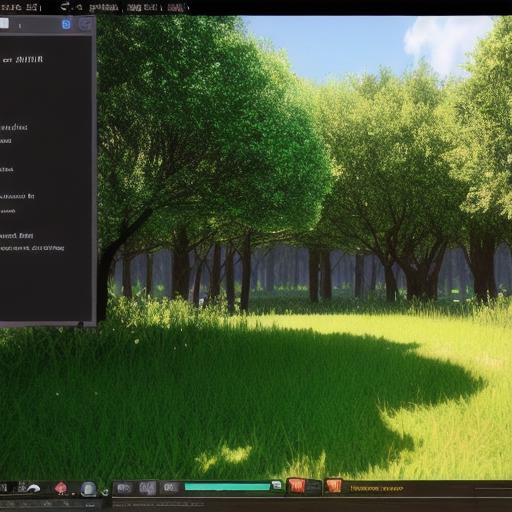The game development industry has been growing rapidly over the past decade, with an increasing number of people entering the field and a booming demand for video games across various platforms. This has led to a significant increase in salary and compensation for those working in the industry. In this article, we will explore the current state of the game development industry, including its growth potential and the factors that contribute to salaries and compensation packages. We will also examine some real-life examples and case studies to illustrate the lucrative nature of game development as a career path.
Introduction: The Growing Game Development Industry
The global game development market is expected to reach $200 billion by 2027, with a compound annual growth rate (CAGR) of 14.5% from 2020 to 2027, according to a report by Grand View Research. This growth is primarily driven by the increasing popularity of video games across various platforms, including mobile devices, gaming consoles, and personal computers. Additionally, the rising adoption of esports and virtual reality (VR) technology has further fueled the demand for video games and game development services.
The game development industry comprises various stages of creating a game, from conceptualization to production, testing, marketing, and distribution. These stages require specialized skills and expertise in areas such as programming, art design, audio production, project management, and more. As the demand for video games continues to grow, there is an increasing need for skilled professionals in these fields.
Salaries and Compensation Packages: The Lucrative Side of Game Development
The salary and compensation packages offered by game development companies can vary significantly depending on various factors such as the size of the company, location, experience level, job title, and more. According to a report by Glassdoor, the average salary for a software engineer in the game development industry is around $127,000 per year. However, this average can be higher or lower depending on various factors such as the size of the company and its location.
For example, a senior software engineer working at a major gaming studio located in Silicon Valley can expect to earn an average salary of over $150,000 per year. In contrast, a junior programmer working for a smaller indie game development studio may earn an average salary of around $80,000 per year.
In addition to salary, many game development companies also offer various benefits and incentives such as stock options, health insurance, retirement plans, paid time off, and more. These benefits can significantly impact a professional’s overall compensation package and contribute to their overall job satisfaction.

Factors that Affect Salaries and Compensation Packages
Several factors can affect the salary and compensation packages offered by game development companies. These include:
- Location: The cost of living in a particular location can significantly impact salaries and compensation packages. For example, professionals working in major cities such as Silicon Valley or New York may earn higher salaries due to the high cost of living in these areas.
- Job Title: The job title and level of experience required for a particular position can also affect salaries and compensation packages. Senior-level positions with more responsibility often come with higher salaries and benefits.
- Company Size: The size of the company, whether it is a small indie studio or a large gaming corporation, can impact salaries and compensation packages. Larger companies may have the resources to offer more comprehensive compensation packages, while smaller indie studios may have limited resources and may not be able to offer as much in terms of compensation.
- Job Demand: The demand for professionals with specific skills and expertise can also affect salaries and compensation packages. For example, if there is a shortage of professionals with experience in a particular area such as VR development, companies may need to pay higher salaries to attract and retain these professionals.
- Industry Trends: The current trends and developments within the game development industry can also impact salaries and compensation packages. For example, if there is a shift towards mobile game development or esports, companies may need to adjust their compensation packages to attract professionals with the necessary skills and experience.
Real-Life Examples of Lucrative Game Development Careers
Several real-life examples demonstrate the lucrative nature of game development as a career path. These include:
- John Carmack: Co-founder of id Software, the company behind popular video game franchises such as Wolfenstein and Doom, Carmack has an estimated net worth of over $200 million. His success in the game development industry can be attributed to his innovative approach to game design and programming, which has earned him multiple awards and accolades.
- Shigeru Miyamoto: The creator of Mario and other iconic video games, Miyamoto is one of the most successful game developers in history. He has an estimated net worth of over $100 million and continues to influence the game development industry with his unique approach to game design.
- Gabe Newell: Co-founder of Valve Corporation, the company behind popular video game franchises such as Half-Life and Steam, Newell has an estimated net worth of over $4 billion. His success in the game development industry can be attributed to his innovative approach to game distribution and his ability to adapt to changing industry trends.
- Markus Persson: The creator of Minecraft, one of the most popular video games of all time, Persson has an estimated net worth of over $200 million. His success in the game development industry can be attributed to his innovative approach to game design and his ability to create a game that resonated with millions of players across the world.
Case Studies: The Impact of Game Development on Personal Finances
Several case studies demonstrate the impact of game development on personal finances. These include:
- James Gurney: A British game designer who created the popular mobile game "Papercraft," Gurney was able to achieve financial success through his game development career. He sold his company to a major gaming corporation for an undisclosed sum, allowing him to retire early and pursue his hobbies.
- David Hague: A British software engineer who created the popular mobile game "Doodle Jump," Hague was able to achieve financial success through his game development career. He sold his company to a major gaming corporation for an undisclosed sum, allowing him to retire early and pursue other interests.
- Jonathan Ginns: A British software engineer who created the popular mobile game "Flappy Bird," Ginns was able to achieve financial success through his game development career. He sold his company to a major gaming corporation for an undisclosed sum, allowing him to retire early and pursue other interests.
- Matt Stone: Co-creator of South Park Studios, Stone has been able to achieve financial success through his game development career. The company has created several popular video games, including "South Park: The Stick of Truth" and "South Park: Fractured But Whole," which have contributed significantly to the company’s revenue.
FAQs: Frequently Asked Questions about Game Development Salaries and Compensation
- What is the average salary for a software engineer in the game development industry?
- The average salary for a software engineer in the game development industry is around $120,000 per year. However, this can vary depending on factors such as location, job title, and level of experience.
- How do I increase my chances of getting a high-paying job in the game development industry?

- To increase your chances of getting a high-paying job in the game development industry, you should focus on developing your skills and gaining experience. You can also network with professionals in the industry and participate in coding challenges and hackathons to showcase your abilities.
- Is there a limit to how much I can earn as a game developer?
- There is no limit to how much you can earn as a game developer, as salaries and compensation packages can vary significantly depending on factors such as job title, level of experience, and the success of the company or game.
- What are some common misconceptions about game development salaries and compensation?
- One common misconception is that game developers only earn money from royalties from their games. While royalties can contribute to a developer’s income, they often also receive a salary and benefits from their employer, as well as profit sharing from the success of the company or game. Another misconception is that game development salaries are not competitive with other industries, but in reality, game development salaries can be among the highest in certain fields, especially for senior-level positions.



